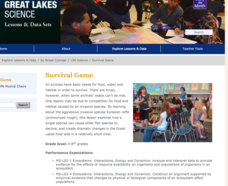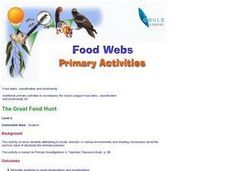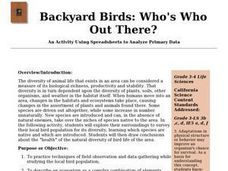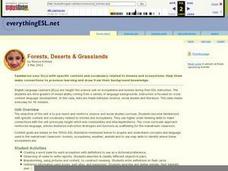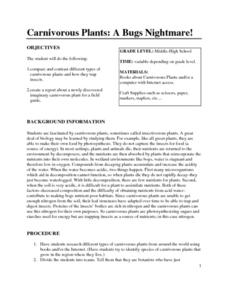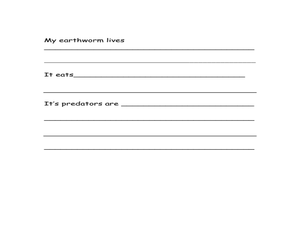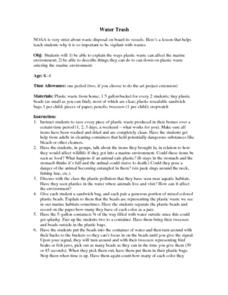Curated OER
What's the Difference?
Students analyze the similarities in different species. This activity is part of a multi-segmented unit on the diversity of life. In this segment, students classify shoes to mimic the scientific categories of the classification system.
Curated OER
Endangered Species
Students explore the various reasons for animals becoming endangered and threatened with extinction. Within this lesson, students choose an animal to research and then creativity introduce their animal to the rest of the class through...
Curated OER
Animal Life Histories Derived From Morphology
Students learn the mechanisms of natural selection by deducing information from the physical appearance of the animal.
Curated OER
Species Charades
Learners identify endangered species. In this endangered species lesson, the teacher leads a discussion about endangered species, then the class plays a game of charades to pantomime animal behavior.
Curated OER
Water Pollution, Stream Ecosystems
Students participate in a series of simulated activities designed to demonstrate the interconnectedness between the environment and the organisms that live there. They explore how polluting one element of an environment affects the...
Curated OER
Ecology and the Conservation of Natural Resources
Learners examine the habits of various organism and evaluate the need for conserving natural resources. They role-play as migrating birds traveling between habitats encountering hazards along the way. They observe animals in a...
Curated OER
The Environments of Big Sur -- Which Do We Protect?
Learners investigate the geological, climatic, and biological features of Big Sur. They watch a video, conduct Internet research, and create a script and images in the form of an outline in a simulation of an environmental group.
Curated OER
Birds of Wisconsin
First graders explore the job done by ornithologists. They role play identifying the characteristics that make a bird a bird. They discuss what makes each bird species unique. Students are introduced to Wisconsin's most common and rare...
Michigan Sea Grant
Survival Game
Musical chairs may be a classic game, but Ruffe Musical Chairs is a unique lesson on invasive species! Using the time-honored game, pupils role play the behaviors of the invasive fish called Eurasian ruffe. Learning about this aggressive...
Curated OER
The Great Food Hunt
Students locate 'animals' in various environments and draw conclusions about the survival value of structures the animals possess. They create model macaroni animals and hide them and other teams of students find them and evaluate the...
Curated OER
Dull Duck, Dashing Duck
Students examine the different colors and patterns found on animals bodies, specifically birds. Through discussion, students discover the use of the colors and patterns for protection from predators and the advantages while hunting prey,...
Curated OER
March Market
Students role play a living wetland food web. They trace the food web associated with the items in their lunch.
Curated OER
Penguin Parents are Cool
Fourth graders explore the lives of penguins and the relationship between them and their parents. They compare and contrast penguin populations in various areas of the world as well as their nesting sites. After constructing a penguin...
Curated OER
Sorting Pond
Students practice balancing while learning the classifications of different animals
Curated OER
Sustainable Livestock
Students investigate healthy eating habits by researching livestock. In this food sustainability instructional activity, students research the negative impact factory farming has on our environment due to pollution. Students define...
Curated OER
Backyard Birds: Who's Who Out There?
Students practice techniques of field observation and data-gathering while studying local bird population, describe ecosystem as complex combination of elements, which can affect or be affected by each other, and determine effects of...
Curated OER
Forests, Deserts, & Grasslands
Third graders complete activities to become familiar with the content and vocabulary related to biomes and ecosystems in order to mainstream into the classroom.
Curated OER
Carnivorous Plants: A Bugs Nightmare!
Young scholars research carnivorous plants and how they trap insects. They role play as botanists to write a research field guide about a newly discovered imaginary carnivorous plant.
Curated OER
Species at Risk: Recovery Teams to the Rescue!
Sixth graders discuss how certain species and plants are deemed endangered. They work together in conservation recovery teams to research an endangered species. Then they explore efforts to make sure that the existence of these species...
Curated OER
Earthworms and Making a Wormery
Students explore the environment by researching insects. In this earthworm lesson, students utilize soil and plexiglass to build a see through wormery in which students can observe the worms at work. Students identify the benefits of...
Curated OER
Problems in Pollutia
Fifth graders, in groups, pretend as if they live in the imaginary kingdom called Pollutia. They make recommendations about environmental issues and give short speechs on how each problem should be solved.
Curated OER
Water Trash
Students explain the ways plastic waste can affect the marine environment. They are able to describe things they can do to can down on plastic waste entering the marine environment.










